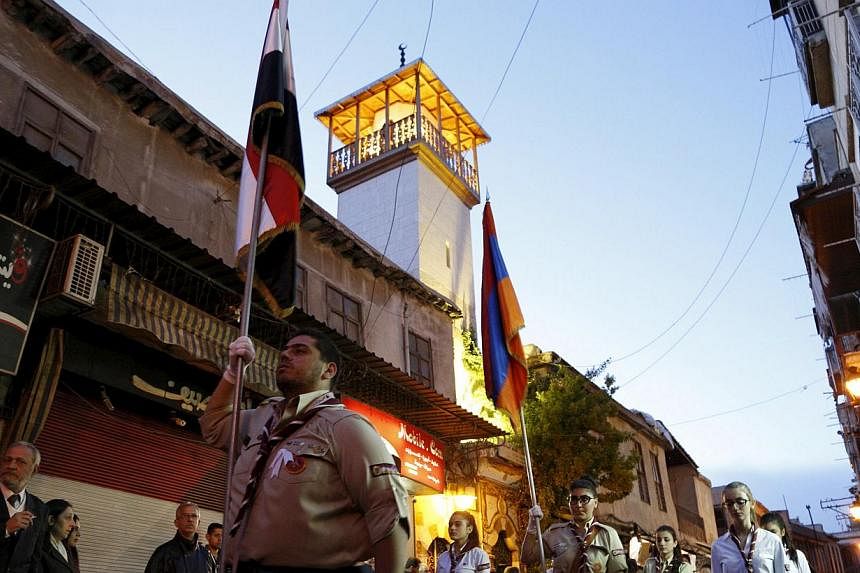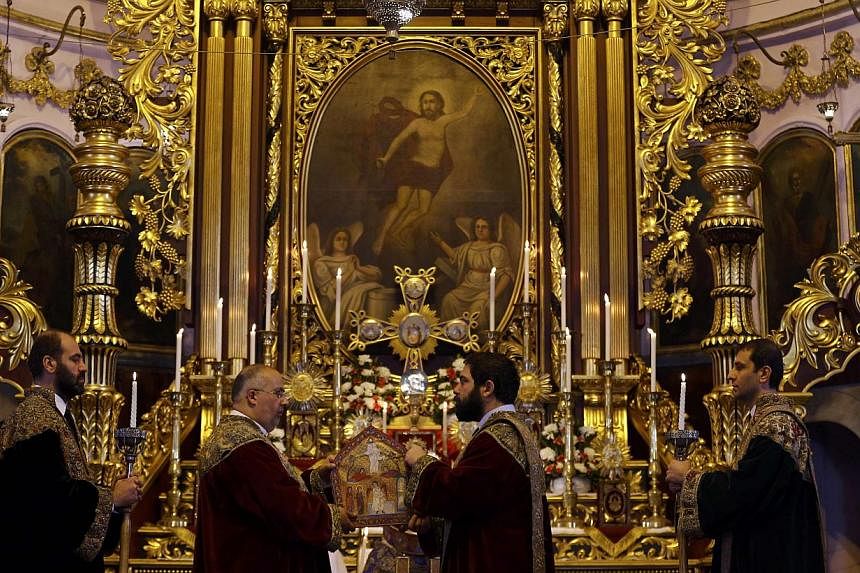YEREVAN (AFP) - Armenians on Friday marked the centenary of the massacre of up to 1.5 million of their kin by Ottoman forces as France called on Turkey to recognise the 1915 slaughter as genocide.
At an emotional ceremony in the capital Yerevan, the French leader called on Turkey to use "other words", referring to Ankara's refusal to recognise as genocide the Ottoman Empire's massacre of Armenians.
"Important words have already been said in Turkey, but others are still expected, so that shared grief can become shared destiny," Hollande told an audience that included Russian President Vladimir Putin, the leaders of Cyprus and Serbia and delegations from some 60 countries.
The Kremlin strongman for his part said Russia was standing shoulder to shoulder with ex-Soviet Armenia.
"There is no and cannot be justification for mass murder of people," Putin said to a standing ovation from the audience at a memorial complex atop a hill in the Armenian capital.
Putin appeared to use the ceremony to refer to the Ukraine conflict which pitted Russia against the West, pointing to the rise of "radical nationalists" and Russophobia.
Armenia's Serzh Sarkisian thanked leaders and dignitaries for attending the commemorations.
"I am grateful to all those who are here to once again confirm your commitment to human values, to say that nothing is forgotten, that after 100 years we remember."
Earlier in the day he laid a wreath at a hilltop memorial commemorating the victims.
Under a leaden sky shedding rain, foreign diplomats followed, each holding a yellow rose to put into the wreath laid at the foot of a monumental 44-metre needle, symbolising the nation's rebirth.
Later Friday, hundreds of thousands will join a procession to the genocide memorial - Armenia's most visited landmark - carrying candles and flowers to lay at the eternal flame.
From New York to Paris to Beirut, members of the massive Armenian diaspora that came into existence as a result of the slaughter that went on until 1917 were also to commemorate the sombre anniversary.
- Turkey's ire -
The patchy list of foreign dignitaries attending commemorations in Yerevan highlights the lack of international consensus over Armenia's bid to get the massacres recognised internationally as a genocide.
More than 20 nations - including France and Russia - have so far recognised the genocide, a definition supported by numerous historians.
German President Joachim Gauck was expected to draw an angry reaction from Turkey after he condemned Thursday the massacres as genocide for the first time, speaking at a Berlin religious service.
Gauck said that the then German empire - Ottoman Turkey's ally in WWI - bore "shared responsibility, possibly shared guilt for the genocide."
Ankara on Wednesday recalled its ambassador to Vienna in response to Austrian lawmakers' decision to condemn the massacre as "genocide".
Turkey has said up to 500,000 people were killed, but mostly due to war and starvation, and rejects the use of the term "genocide".
US President Barack Obama on Thursday would only go so far as to describe the World War I massacres as "terrible carnage".
- Mass canonisation -
On Thursday, the Armenian Church conferred sainthood on the genocide victims in what was believed to be the biggest canonisation service in history.
The ceremony outside Armenia's main cathedral at Echmiadzin, close to Yerevan, ended at 7:15 pm local time, or 19:15 according to the 24-hour clock, to symbolise the year when the massacres started.
"During the dire years of the genocide of the Armenians, millions of our people were uprooted and massacred in a premeditated manner, passed through fire and sword, tasted the bitter fruits of torture and sorrow," said Karekin II, the head of the Armenian Apostolic Church.
Ex-Soviet Armenia and the Armenian diaspora worldwide have battled for decades to have the World War I massacres recognised as a targeted genocide.
But modern Turkey, which was born out of the ashes of the Ottoman Empire, has refused to do so, and relations remain frozen to this day.
Ankara says 300,000 to 500,000 Armenians and at least as many Turks died in civil - rather than religious - strife when they say Armenians rose up against their Ottoman rulers and sided with invading Russian troops.
In a rare interview with Turkish television, Sarkisian expressed hope the two countries could mend fences.
"It is obvious that a reconciliation between the two peoples will have to come about through Turkey recognising the genocide," he told CNN-Turk.
Ahead of the ceremonies, Turkey kicked up a diplomatic storm, condemning growing "racism" in Europe.
This month Ankara also recalled its envoy to the Vatican after Pope Francis described the killings as "the first genocide of the 20th century."






